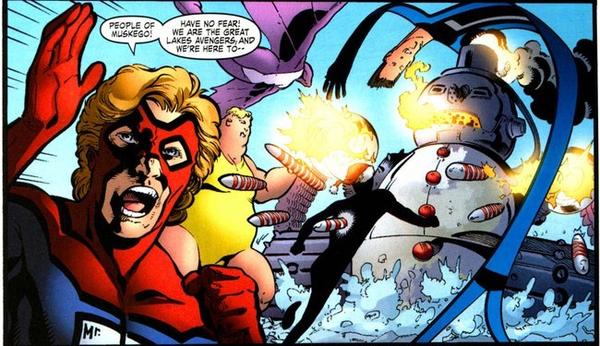As an avid comic book fan, when one thinks of the newly-released Avengers Assemble, it is their more humble, more entertaining, and much less successful colleagues – the Great Lakes Avengers (subsequently renamed S.W.O.R.D., Great Lakes X-Men, and so forth) that spring to mind. For those living in miserable ignorance, the Great Lakes Avengers lived in the same fictional universe as the Avengers, occasionally had support from the Avengers, and even received a cease-and-desist from the Avengers. They were not, however,anywhere near to being Earth’s mightiest heroes.
Their portfolio is inauspicious – they patrol and protect the Great Lakes area of the USA, a region not known for drawing the attention of megalomaniacal supervillains. Their leader is useless – his immortality sounds handy, but inpractice serves largely to distract the enemy by getting himself killed in the opening moments of any given battle. He spends many a panel mourning his lost love, Dinah Soar- an intelligent, bipedal pterodactyl. Other members had theability to act as a living portal (useful for inadvertently giving thieves access to property), the gift of gaining great strength but also proportionate dress size, and the ability to command squirrels. It is telling that the last hero left because she felt her own success was overshadowing the rest of the group.
The Great Lakes Avengers is a fantastically enjoyable comic. Quality writing and agroup of lovable misfits contribute much of that entertainment. But its key appeal is the transgression; freed from the constraints of an established mythos, but still canonically linked to the deadly serious Marvel universe, Great Lakes Avengers could break any narrative convention at any time without sacrificing meaningfulness. Lampooning established superhero groups is a common theme in comics – the graphic, crude and wonderful The Boys is similar butplacing the parody in the same universe as its subject gives the whole thing acertain added joy.
Canonical spoof reappeared in stronger form in the superlative Nextwave: Agents of H.A.T.E. Again set within the confines of the Marvel universe, Nextwave is essentially one long in-joke on both Marvel characters and conventions. Not that newreaders should be dissuaded from it – the themes are universal, the characters immediately accessible, and the comedy hilarious. Group leader Monica Rambeau has been part of the Marvel universe for decades, first as Captain Marvel until someone else took the title, and then as Photon, until that title was also taken away… by another former Captain Marvel. Writer Warren Ellis took the joke further with shabby superhero The Captain – he has tried endless variations of Captain *Something*, each time the character loses a dispute with another holder of that title. Eventually he gave up and started calling himself The Captain. His crew fight near-forgotten C-listers of Marvel’s back catalogue and ultimately face off with the evil mastermind behind all their travails – a little-known sidekick of a hero himself barely on the B-list.
One of the most prolific writers of tangential superhero teams is Britain’s own psychedelic prophet of the comic world, Grant Morrison. His run of the perpetually downtrodden Doom Patrol stands as some of his greatest work in the realm of mainstream comics – unfortunately, despite their surreal adventures and glaring psychological flaws, they are the A-team of what they do (saving the world from dangers other heroes don’t even understand), so cannot possibly qualify for B-Team status. A more appropriate example of subversion of the team-up is the series The Seven Soldiers of Victory – a superhero team who, for convoluted reasons, could never meet.
Grant Morrison was granted effective carte blanche, and used it to reinvent several near-forgotten members of DC’s back catalogue. Not content with merely rewriting the heroes, Morrison stepped outside the structure of thesuperhero team-up itself, designing the series as a “modular” comic: each story could be read in isolation from the others. The individual results were mostly brilliant – a superhero newspaper mascot chasing cutlass-wielding pirates sailing subway trains, a vengeful Frankenstein’s monster tracking a usurped elven king across Mars, a lost Puritan colony eking out an existence in azombie-based economy. Whether the complete product was successful as a team-up comic is arguable. As individual stories, however, they stand as a triumph in what can be accomplished within the often conservative world of mainstream comic books, provided you’re willing (and able) to cast aside the rules.
















{ 0 comments… add one now }